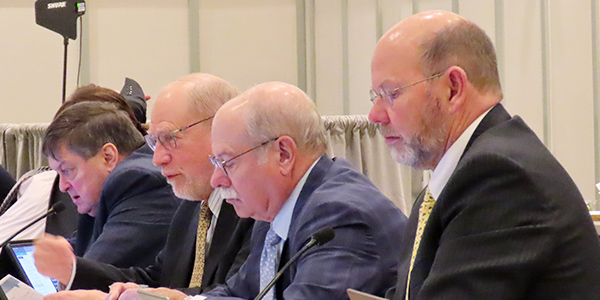NERC’s Member Representatives Committee and Board of Trustees met via conference call on Thursday after in-person meetings in D.C. were canceled because of the COVID-19 pandemic.
Interviews Planned for Potential Canadian Trustees
The Nominating Committee has prepared a slate of six candidates to replace former Trustee David Goulding, who retired in January, and plans to hold interviews next month. The interviewing panel will include board Chair Roy Thilly, Vice Chair Kenneth W. DeFontes Jr., MRC Chair Jennifer Sterling, MRC Vice Chair Paul Choudhury and Trustee Colleen Sidford.
Along with Goulding’s replacement, the committee is also searching for a trustee to fill the seat of Jan Schori, who will retire at the end of 2020. As Goulding’s retirement leaves the board with only one Canadian trustee, and it is required to have at least two, the team decided to speed up the search for a successor who can be seated as soon as possible. (See “Search Begins for New Board Members,” NERC MRC Briefs: Feb. 5, 2020.)
For Schori’s replacement, the committee has engaged executive search firm Russell Reynolds and hopes to schedule interviews in early November. The interviews will be conducted in person if possible, but the committee is also exploring the option of remote interviews. Next month’s interviews are already set to be conducted electronically.
Align Expenditure Moves to FERC for Approval
The board agreed to request a $3.8 million budget variance from FERC to account for delays in NERC’s Align software project, intended to improve and standardize compliance monitoring and reporting processes across the ERO Enterprise.
Align was scheduled to be released in September 2019 but was delayed several times in order to include additional security features in the initial release. The delays caused the cost of the project to rise beyond its original estimate by up to $2 million, NERC interim CFO Andy Sharp said during the MRC conference call in April. (See Align Tool Set for 2021 Rollout.) The board also approved this expenditure at Thursday’s meeting.
The budget variance will be partially covered by a projected $1 million surplus from NERC’s operating contingency reserves for this year, but the majority will be financed by $2.8 million in debt. The organization will pursue a 60-month term rather than the typical 36 months, as the current low interest rates mean overall servicing costs will be the same or lower than previous projections of debt service for this year.
“I had asked the question earlier … as to whether we should really be thinking about doing financings for any of this, and the answer that came back was ‘yes,’” said Bill Gallagher, special projects chief for the Vermont Public Power Supply Authority. “I’ve always been looking at NERC to be debt-free, but I guess in this particular set of circumstances, it probably makes sense” to approve the debt.
Other Approvals
The board approved action on the following reliability standards:
- Adopt reliability standard CIP-002-6, governing bulk electric system cyber system categorization, and retire CIP-002-5.1a per the recommendations of the CIP Version 5 Transition Advisory Group.
- Withdraw proposed reliability standard VAR-001-6, covering voltage and reactive control. The decision would leave currently effective standard VAR-001-5 in place.
Board members also approved revisions to the current pro forma delegation agreements between NERC and the regional entities, which are set to expire at the end of the year. The revisions would include:
- eliminating maps of RE boundaries in favor of textual descriptions, which the organization feels would allow more precision in assigning registered entities to specific REs;
- clarifying requirements regarding the nomination of independent board members;
- removing outdated language in light of the dissolutions of the SPP RE and Florida Reliability Coordinating Council;
- prohibiting stakeholders from leading RE board compliance committees;
- allowing REs greater flexibility regarding the use of funds collected through penalties; and
- clarifying that delegation agreements may be terminated earlier than the end of the five-year term as long as written notice is provided of at least one year.
COVID-19 Prompts Further Meeting Changes
With future developments in the pandemic still uncertain, the board has decided that its next meeting, as well as the MRC’s, will be carried out via conference call again. The meetings were previously scheduled to take place Aug. 19-20 in Vancouver, Canada.
Chair Thilly said the board has deferred a decision on its final meeting of 2020, planned for Nov. 4-5 in Atlanta, while it monitors the progress of the COVID-19 response and recovery. The leadership is considering several options for the meeting that include going forward as planned, holding an online session again, or restricting in-person meetings to board and MRC members only, with others listening in via conference call.
“Whether that will be possible to establish [while maintaining] social distancing, or whether any meeting will be possible at that time, is simply unknown. But we will try to make that decision in a timely way so that people can prepare,” Thilly said.





